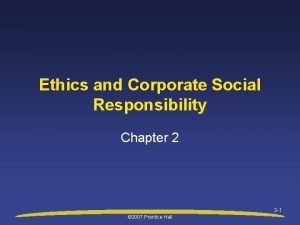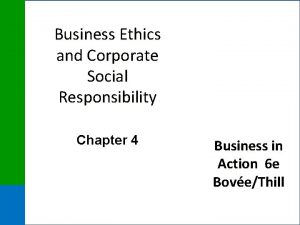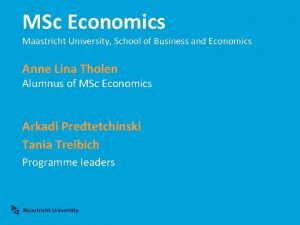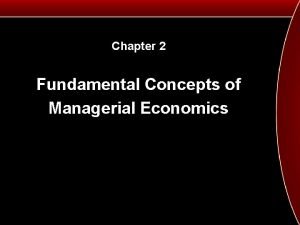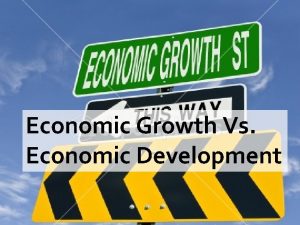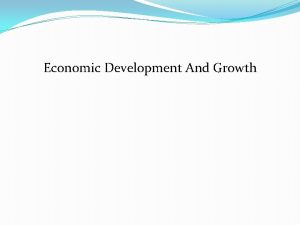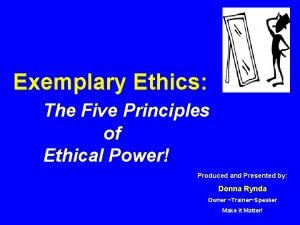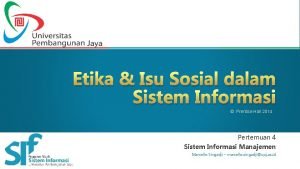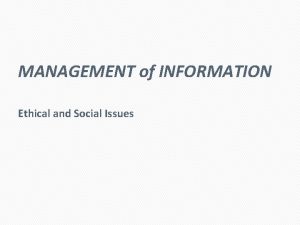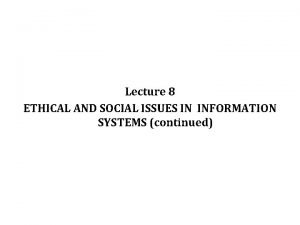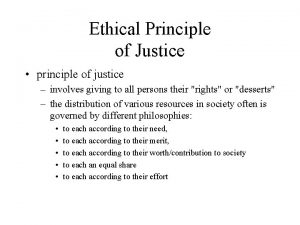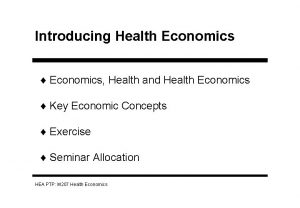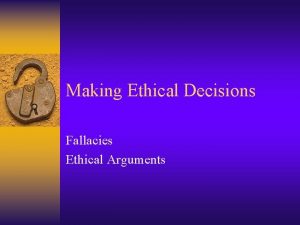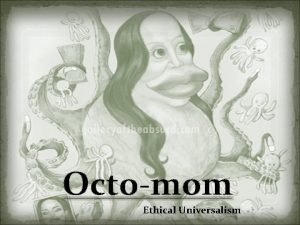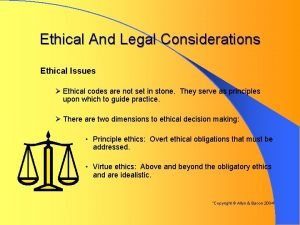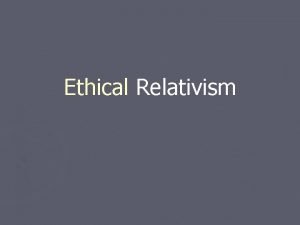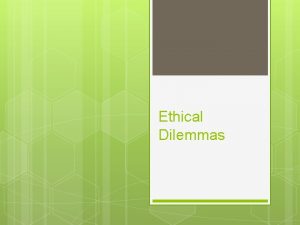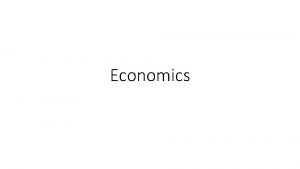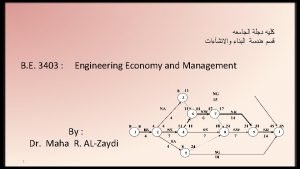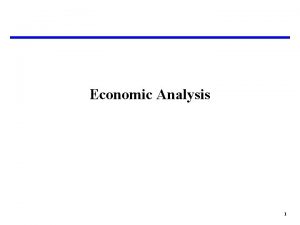HEALTH ECONOMICS ETHICAL PRINCIPLES IN HEALTH ECONOMIC ANALYSIS



















- Slides: 19

HEALTH ECONOMICS ETHICAL PRINCIPLES IN HEALTH ECONOMIC ANALYSIS Dr. S. GRENA SANTHI ASSISTANT PROFESSOR OF ECONOMICS

INTRODUCTION From a public health point of view, health economics is just one of many disciplines that may be use to analyze issues of health and health care. But from an economics point of view , health economics is simply one of many topics to which economic principles and methods can be applied

Production resources, scarcity and opportunity cost 1. 1 Production All production requires the use of resources such as raw materials and labour, and we can regard production as a process by which these resources are transformed into goods:

Mediating factors Inputs (Resource s) Production process Outputs (Goods or services )

1. 2 Resources resources are know to be limited in quantity the problem of scarcity of resources means that choices must be made about what goods are produced, how they are to be produced and who will consume them. Another way to view this is that we cannot have all of the goods that we want, and in choosing that we will have , we have to trade off one good for anther.

1. 3 scarcity In the economy as a whole , there are not enough scarce resources to meet all of the wants that people have , so we have to choose which wants are met and which are not met ; in the health care system there are not enough health care resources to meet all of the have , he health needs that people have , so we have to choose which needs are met and which are not met.

1. 4 Opportunity cost Costs in economics usually means opportunity costs. this concept is quite different to the more familiar idea of financial costs, which is the cost of goods, services and scarce resources in terms of the money that must be paid to obtain them.

Markets Demand Supply 2 marketing A market brings together the demand for goods from consumers and the supply of those from suppliers. consumers and suppliers base their buying and selling on the price that they must pay or will receive. price therefore acts as a signal to both groups as to what they should do in the market. Consumers will want to buy more if the price is lower , but suppliers will want to sell more if the price is higher.

2. 1 Demand for health care, demand for health and need Health does have characteristics that more conventional goods have; it can be manufactured ; it is wanted and people are willing to pay for improvements in it and it is scarce relative to people ’s wants for it. however , its relationship with the demand for health care is not one –to-one , because although health is affected by health care , it is also affected by many other thing and it also affects other aspects of welfare , not just v

2. 2 Supply The supply side of the market is analysed in economics in two separate but related ways. there are two well-know theoretical extremes of marked structure. perfect competition has very many firms in the market so that none has any real economic power , makes any profits, prices are as low as they can be and output is as high as be. �

3. Incremental analysis and the margin Economics analyses many economics activities by according to marginal principles , which is a special case of what is called incremental analysis. Incremental analysis means that the effects of changes in the use of resources are examined according to they differ from current use.

4. Efficiency and equity Economics analysis usually judges the way in which resources are used according to two main criteria : efficiency and equity refers to obtaining the greatest output for a given set of resources.

4. 1 Efficiency The technical definitions of efficiency described hare use the labels by morris, Devil, Parkin and Spencer (2012). Economists are specialists in the analysis of efficiency and largely agree about what it means , and about definitions of different types of efficiency. the same concept may be given different names and the same name be given to different concepts.

�Pareto efficiency is therefore a contentious idea as a way of thinking about how resources should be allocated at a societal level , but does form the basis of definitions of efficiency in economics more narrowly. we will examine three types: technical efficiency economics efficiency social efficiency

Technical efficiency Production is technically efficient if the most output possible is produced from a given set of inputs , or the fewest inputs possible are used to produce a given amount of output

Economics efficiency as will be explained in the section on economics evaluation technical efficiency is only concerned with how many inputs are used in production, while economic efficiency is related to the cost of those inputs. Economics efficiency is achieved if the most output possible is produced for a given cost, or a given amount of output is production at the lowest possible cost.

Social efficiency is a much broader concept. Both technical efficiency and economics efficiency concern production , and if the supply side of the marked achieves economic efficiency in every market , there is allocative efficiency in production for the economy as a whole

4. 2 Equity is always an important criterion for allocation of resources. However , it is observable that people attach more importance to equity in health and health care than they do to many other goods and services. Equity is an important policy objective in almost every health care system in the world.

Conclusion
 Perbedaan ethical dilemma dan ethical lapse
Perbedaan ethical dilemma dan ethical lapse Ethical lenses army
Ethical lenses army Perbedaan ethical dilemma dan ethical lapse
Perbedaan ethical dilemma dan ethical lapse Ethical habits
Ethical habits Maastricht university economics and business economics
Maastricht university economics and business economics Mathematical vs non mathematical economics
Mathematical vs non mathematical economics Time perspective in managerial economics
Time perspective in managerial economics Economic growth vs economic development
Economic growth vs economic development Economic development vs economic growth
Economic development vs economic growth Economics unit 1 lesson 2 difficult choices
Economics unit 1 lesson 2 difficult choices Ethical principles screen
Ethical principles screen Five principles of ethics
Five principles of ethics Candidate ethical principles
Candidate ethical principles Confidentiality ethical principle
Confidentiality ethical principle Reamer's ethical decision making model
Reamer's ethical decision making model Scholastic philosophy of ethics
Scholastic philosophy of ethics Six ethical principles
Six ethical principles Six ethical principles
Six ethical principles Ethical principles governing informed consent process
Ethical principles governing informed consent process Principle of justice
Principle of justice
